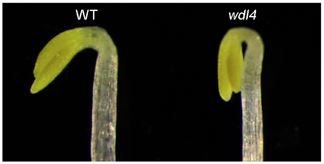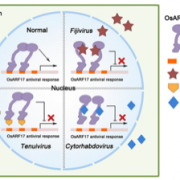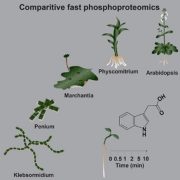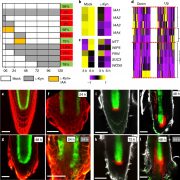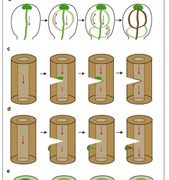The role of the microtubule-associated protein WDL4 in apical hook opening
By Jia Deng, Xiangfeng Wang, Ziqiang Liu, and Tonglin Mao, China Agricultural University
Background: When seedlings emerge through the soil to reach the surface, the apical hook protects the shoot apical meristem and cotyledons from damage by soil particles. The development of the apical hook follows three phases: formation, maintenance and opening. During hook development, cell elongation rates between the inner and outer edge sides of the hook are different. This differential growth results in bending of the tissues and is tightly regulated by diverse factors, such as the plant hormones ethylene and auxin. Microtubules are also essential for plant cell growth and are regulated by multiple microtubule-associated proteins (MAPs). However, the role and underlying mechanisms of MAP-microtubule modules in differential cell growth are poorly understood.
Questions: We wished to know whether and how MAPs and microtubules modulate the differential cell growth of the apical hook.
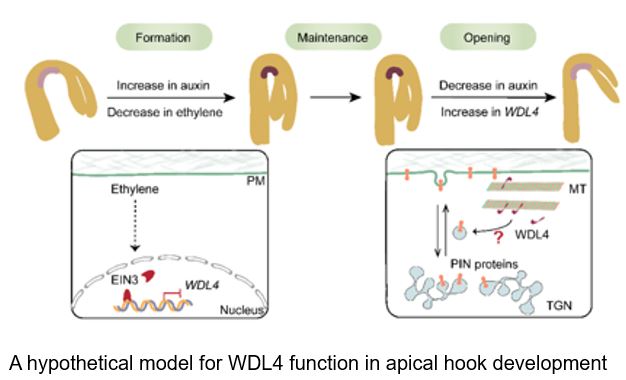 Findings: We determined that Arabidopsis MAP WAVE-DAMPENED2-LIKE4 (WDL4) plays a positive role in apical hook opening. During formation and early maintenance phases, the expression of WDL4 was repressed by ethylene signaling. However, during the late maintenance and opening phases, WDL4 was highly expressed in the hook region. A wdl4 mutant showed a late hook opening phenotype, while overexpression of WDL4 resulted in early hook opening. In particular, the trafficking of auxin efflux carriers was significantly affected in wdl4 mutants. Indeed, wdl4 mutants showed higher auxin accumulation in the inner side of the apical hook. As a result, the cell growth in the inner side of mutant apical hooks is inhibited and hook opening is delayed in wdl4 mutants. Our results demonstrated that WDL4 positively regulates apical hook opening by modulating the auxin maxima and trafficking of auxin efflux carriers, thus unraveling a mechanism for MAP-mediated differential plant cell growth.
Findings: We determined that Arabidopsis MAP WAVE-DAMPENED2-LIKE4 (WDL4) plays a positive role in apical hook opening. During formation and early maintenance phases, the expression of WDL4 was repressed by ethylene signaling. However, during the late maintenance and opening phases, WDL4 was highly expressed in the hook region. A wdl4 mutant showed a late hook opening phenotype, while overexpression of WDL4 resulted in early hook opening. In particular, the trafficking of auxin efflux carriers was significantly affected in wdl4 mutants. Indeed, wdl4 mutants showed higher auxin accumulation in the inner side of the apical hook. As a result, the cell growth in the inner side of mutant apical hooks is inhibited and hook opening is delayed in wdl4 mutants. Our results demonstrated that WDL4 positively regulates apical hook opening by modulating the auxin maxima and trafficking of auxin efflux carriers, thus unraveling a mechanism for MAP-mediated differential plant cell growth.
Next steps: In the future, we will investigate the detailed mechanisms by which WDL4 regulates auxin distribution and the trafficking of auxin efflux carriers.
Reference:
Jia Deng, Xiangfeng Wang, Ziqiang Liu and Tonglin Mao (2021). The microtubule-associated protein WDL4 modulates auxin distribution to promote apical hook opening in Arabidopsis. Plant Cell, https://doi.org/10.1093/plcell/koab080.


